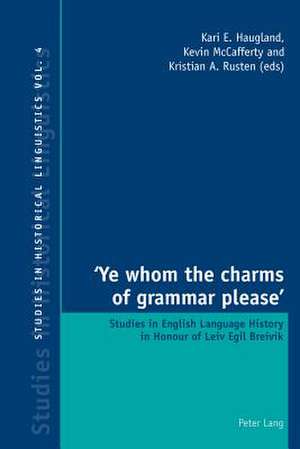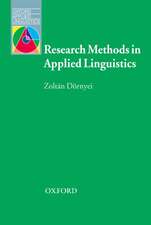'Ye Whom the Charms of Grammar Please': Studies in English Language History in Honour of Leiv Egil Breivik: Studies in Historical Linguistics, cartea 4
Editat de Kari E. Haugland, Kevin McCafferty, Kristian A. Rustenen Limba Engleză Paperback – 22 apr 2014
Preț: 641.75 lei
Preț vechi: 792.29 lei
-19% Nou
Puncte Express: 963
Preț estimativ în valută:
122.84€ • 133.47$ • 103.25£
122.84€ • 133.47$ • 103.25£
Carte tipărită la comandă
Livrare economică 21 aprilie-05 mai
Preluare comenzi: 021 569.72.76
Specificații
ISBN-13: 9783034317795
ISBN-10: 3034317794
Pagini: 411
Ilustrații: 21 Ill. / 46 tables
Dimensiuni: 151 x 226 x 31 mm
Greutate: 0.6 kg
Editura: Peter Lang Gmbh, Internationaler Verlag Der W
Seriile Schriftenreihe der HHL - Leipzig Graduate School of Management, Studies in Historical Linguistics
ISBN-10: 3034317794
Pagini: 411
Ilustrații: 21 Ill. / 46 tables
Dimensiuni: 151 x 226 x 31 mm
Greutate: 0.6 kg
Editura: Peter Lang Gmbh, Internationaler Verlag Der W
Seriile Schriftenreihe der HHL - Leipzig Graduate School of Management, Studies in Historical Linguistics
Notă biografică
Kari E. Haugland is Associate Professor of English Linguistics at the University of Bergen. Her research interests are mainly within English historical linguistics and her current focus is Old English syntax. Kevin McCafferty is Professor of English Linguistics at the University of Bergen. His research interests lie broadly in the field of language variation and change, with a focus on Irish English. He is at present studying the history of Irish English. Kristian A. Rusten is a PhD Research Fellow in English Linguistics in the Department of Foreign Languages, University of Bergen. He has published on null subjects in Old English and is working on a doctoral thesis on referential and generic null subjects in Old, Middle and Early Modern English.
Cuprins
Contents: Kevin McCafferty, Kari E. Haugland and Kristian A. Rusten: Preface: Charms of grammar/Source of all glamour - Kari E. Haugland: Þa rinde hit & Þær comun flod & bleowun windas: On expletives and word order in Old English - Gard B. Jenset: In search of the S (curve) in there - María José López-Couso/Susana Formoso-Rodríguez: There follows + that-clause: A case of syntactic blend? - Kristin Killie: The development of colour adverbs in Norwegian and English: Similar paths, different paths - Toril Swan: Hopefully: The evolution of a sentence adverbial - Gisle Andersen: The double copula revisited - Bjørg Bækken: The noun phrase as a style marker in seventeenth-century English - Dagmar Haumann: On the ascent and decline of the passive tough-infinitive - Kevin McCafferty: I think that I will be after making love to one of them: A revised account of Irish English be after V-ing and its Irish source - Ana Elina Martínez-Insua: Language, medicine and choice: A Systemic-Functional study of Early Modern English medical writing - Kristian A. Rusten: Null referential subjects from Old to Early Modern English - Kristin Bech: Non-specificity and genericity in information structure annotation - Øystein Heggelund: Information structure as an independent word ordering factor in Old and Middle English - Sarah Hoem Iversen: Do you understand this, my little pupil?: Children's dictionaries, pedagogy and constructions of childhood in the nineteenth century - Merja Stenroos: Fugitive voices: Personal involvement in Middle English letters of defence - Anna-Brita Stenström: The pragmatic marker come on in teenage talk - Leiv Egil Breivik: A bibliography.








